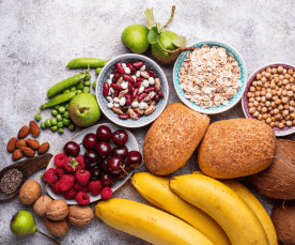Fiber plays a key role in our digestive health and optimal wellness. Dietary fibers, also known as “roughage”, are non-digestible carbohydrates that are found in plant foods. Unlike other types of carbohydrates, fiber is not digested in the body, but rather passes through the body performing important functions along the way. Read on to learn more about fiber and all its benefits for the body.
Tip 1 Increase Your Daily Fiber Intake
Are you eating enough fiber? It is recommended that adults take in about 25-35 grams of fiber per day from food. Dietary fiber comes from fruits, vegetables, legumes, nuts, seeds and grains. To increase your daily fiber work to consume 5 to 10 servings of fresh fruits and vegetables daily. For breakfast, add berries and seeds to your oatmeal. For snacks eat an apple or raw veggies with hummus. For lunch and dinner add berries to your salad, whole grain bread for your sandwiches, or add beans and legumes to your soups or stews.
Tip 2 Soluble Fiber
Types of fiber include soluble and insoluble fiber. Soluble fiber attracts water and forms a gel-like substance that helps the body to slow down digestion and aids in the body maintaining a healthy weight. Soluble fiber includes foods like apples, asparagus, artichokes, avocadoes, bananas, barley, beans, berries, broccoli, Brussel sprouts, dark leafy greens, legumes, lentils, nuts, oats, pears, peppers, squash and sweet potatoes.
Tip 3 Insoluble Fiber
Insoluble fiber absorbs water but does not dissolve in water. Insoluble fiber is often termed a “bulking” agent which helps to move food and waste through the digestive system. This helps the body to have more regular bowel movements and prevents constipation. Food sources of insoluble fiber include bran, carrots, celery, cucumbers, legumes, nuts, seeds, tomatoes, and whole grains. A great source of insoluble fiber is chia seeds, which are 95% insoluble fiber. One ounce of chia seeds has 11 grams of fiber and can be easily added to smoothies, oats, cereals or salads.
Tip 4 Lowers Cholesterol Levels
Studies have shown that eating fiber helps to reduce low-density lipoprotein (LDL) cholesterol, also known as the “bad” cholesterol. Soluble fiber will bind to cholesterol in the small intestine, preventing it from entering your bloodstream. Soluble fiber also helps to slow down digestion, preventing spikes in blood sugar, which allows less triglycerides to form, in turn producing less cholesterol.
Tip 5 Helps Maintain Healthy Weight
A diet that is high in fiber rich foods has been shown to lower weight. Fiber rich foods help the body to fill up faster, stay full longer and decreases the need to eat more frequently. As fiber also binds to fat and sugar molecules, the number of calories that the body holds onto is also lowered.
Tip 6 Fiber Reduces Blood Sugar Spikes
High fiber foods, especially soluble fiber foods, help to slow down digestion and the absorption of glucose (sugar) in the body, which aids in maintaining a more balanced blood sugar level. Adding fiber to your diet will help maintain a consistent level of blood sugar in the body, rather than spikes of high and low sugars as seen with low fiber foods.
Tip 7 Enhances the Health of Gut Bacteria
Within your intestines are several bacteria that aid the body in many processes. A diet that is high in fiber helps to “feed” these bacteria, which improves the overall health of your gut. Having a healthy gut is key to fighting off infections, is necessary for optimal digestion, maintains healthy weight and blood sugar, and even impacts the health of your brain.
Tip 8 Reduced Constipation
People that eat diets that are high in fiber are found to have lower rates of constipation and fewer hemorrhoids. Soluble fiber helps to bring more water to the stool, making it larger and easier to pass, while insoluble fiber adds bulk to the stool allowing it to pass more quickly. Fiber assists hard stool to become softer and keeps things moving along as they should.
Tip 9 Natural Detoxification
High fiber diets have been shown to be natural detoxifiers for the body. As toxins have a tendency to stick to the colon and intestines, fiber works to soak up these harmful compounds. Eating healthy fibers daily keeps the bowels moving and pulling these toxins out.
Tip 10 Keep a Healthy Balance
As with all things, you want to keep a healthy balance of how much fiber you are taking in. Too much fiber can cause gas, bloating, abdominal discomfort and diarrhea. Keeping your daily intake to between 25-35 grams per day, while staying well hydrated, will help to give your body the right balance.
At Besana Health and Wellness, we would love to connect with you to optimize your healthy digestion and assist you with your health goals and wellness. We believe in optimal wellness and vitality and are dedicated to helping you look and feel your best. We believe that it is never too early, or too late, to work towards being the healthiest you.
Sources used in this blog:
Every Day Health
Healthline
